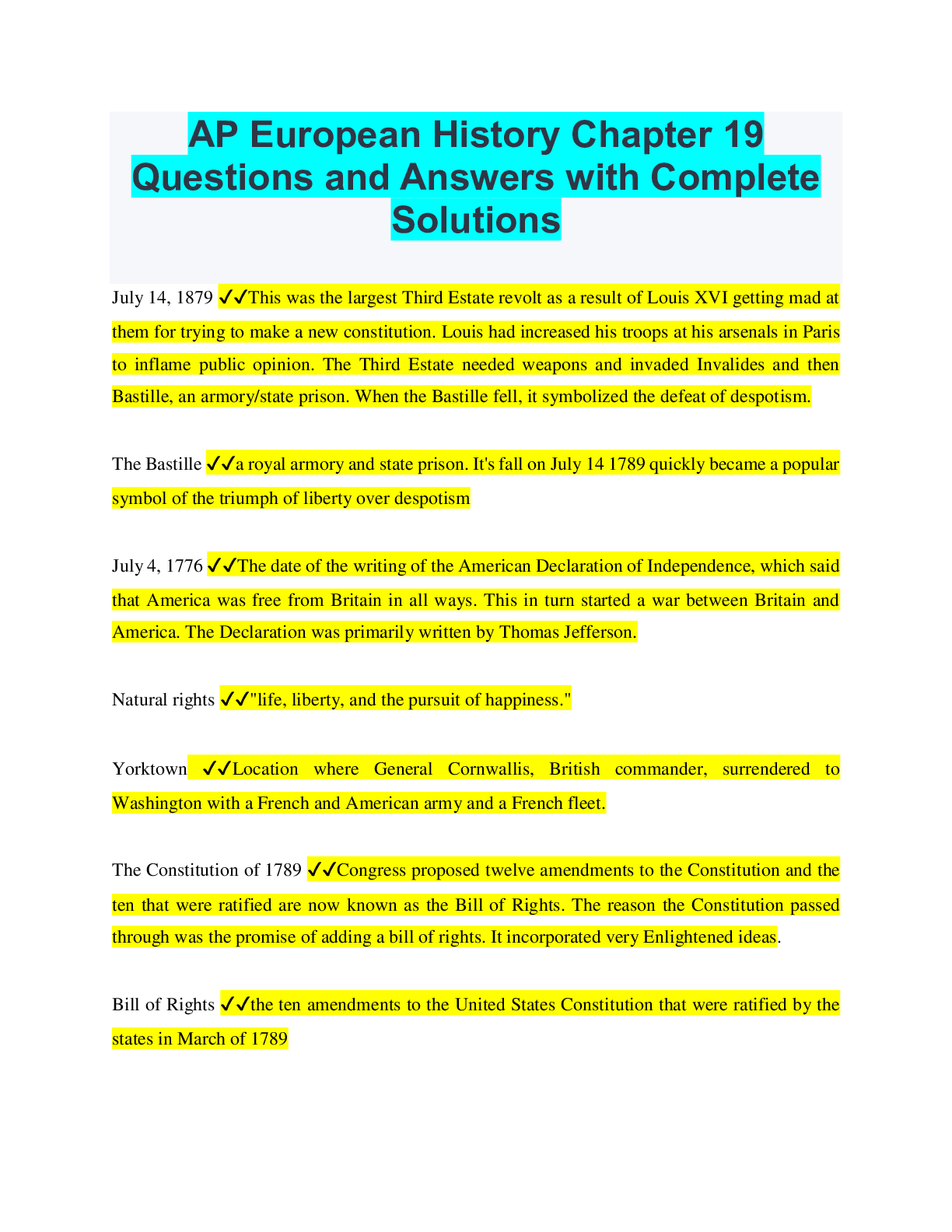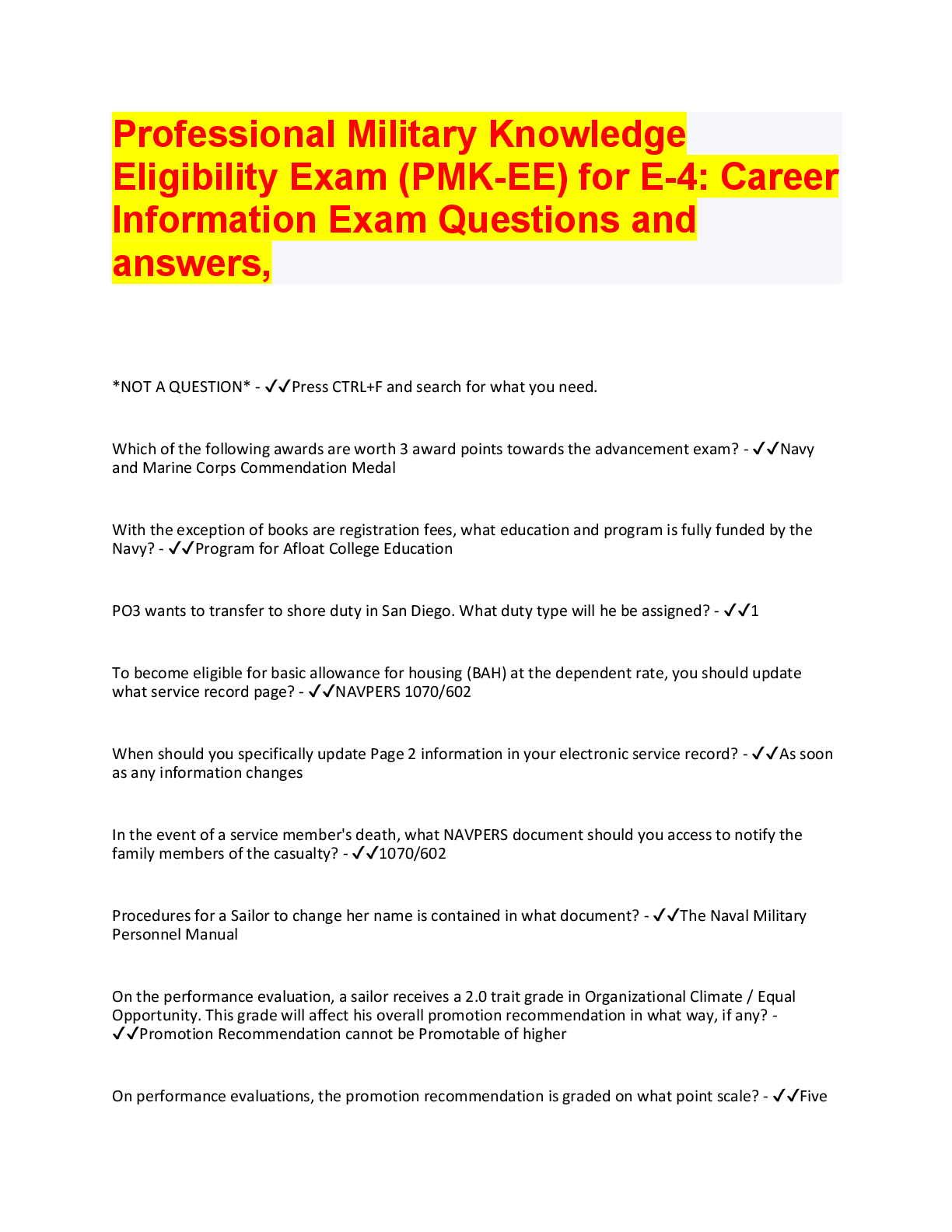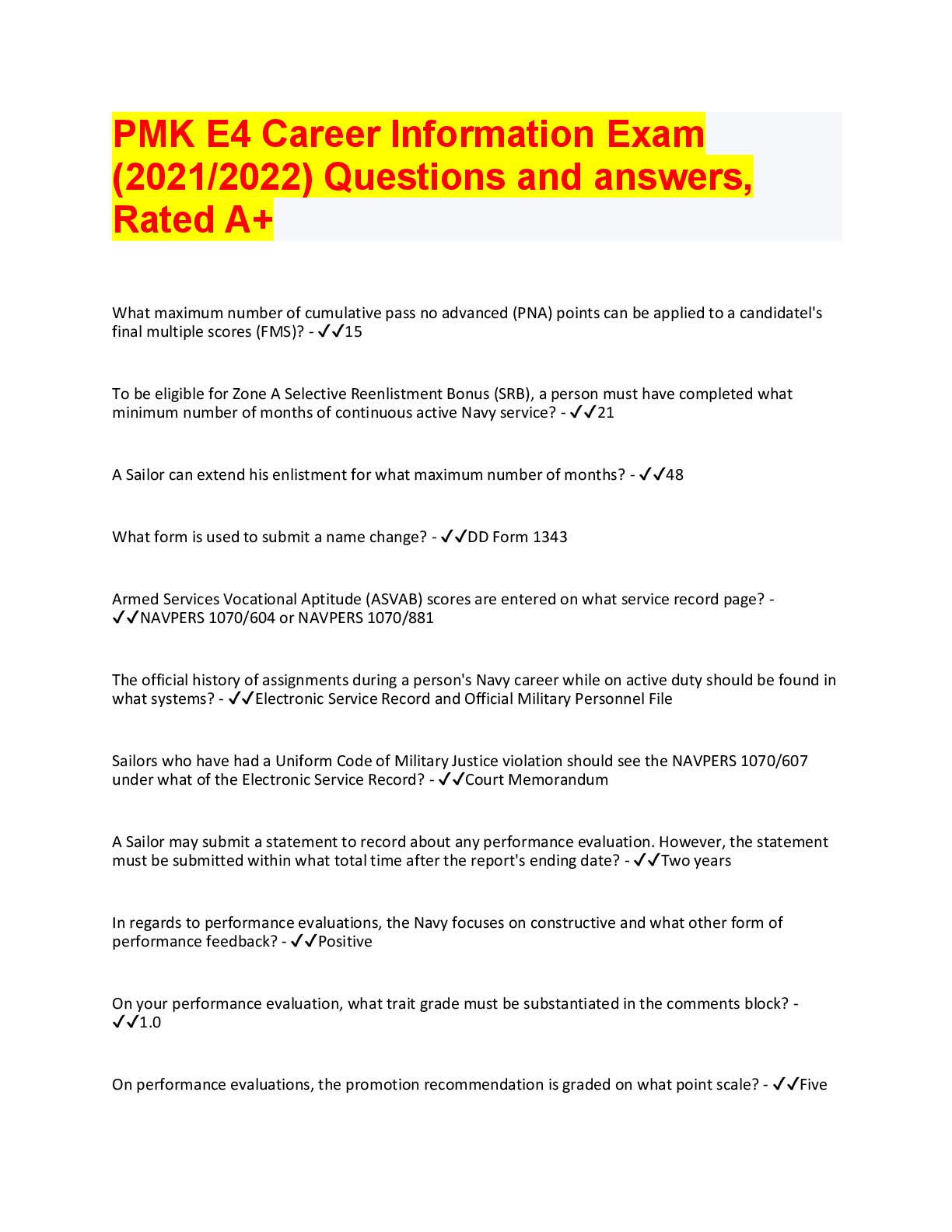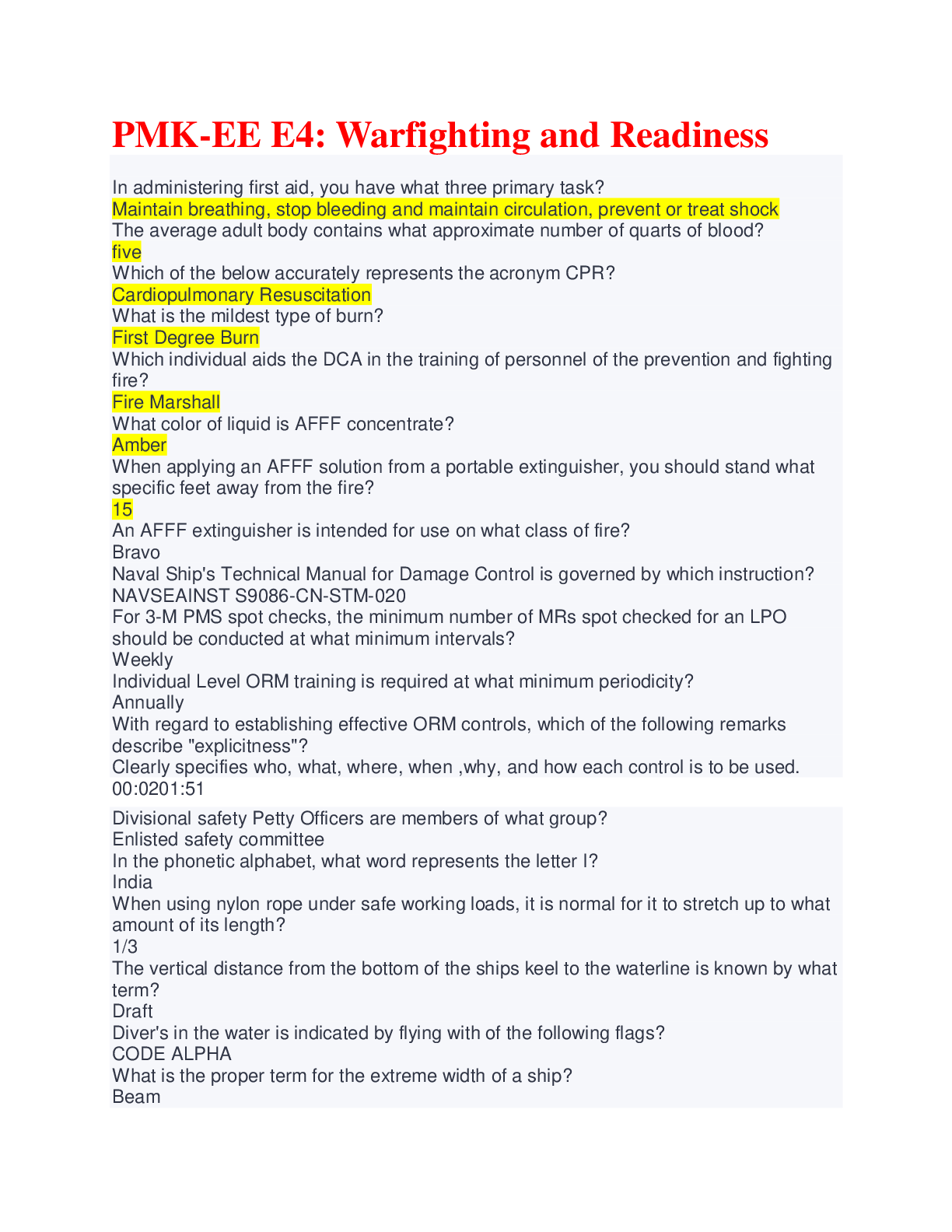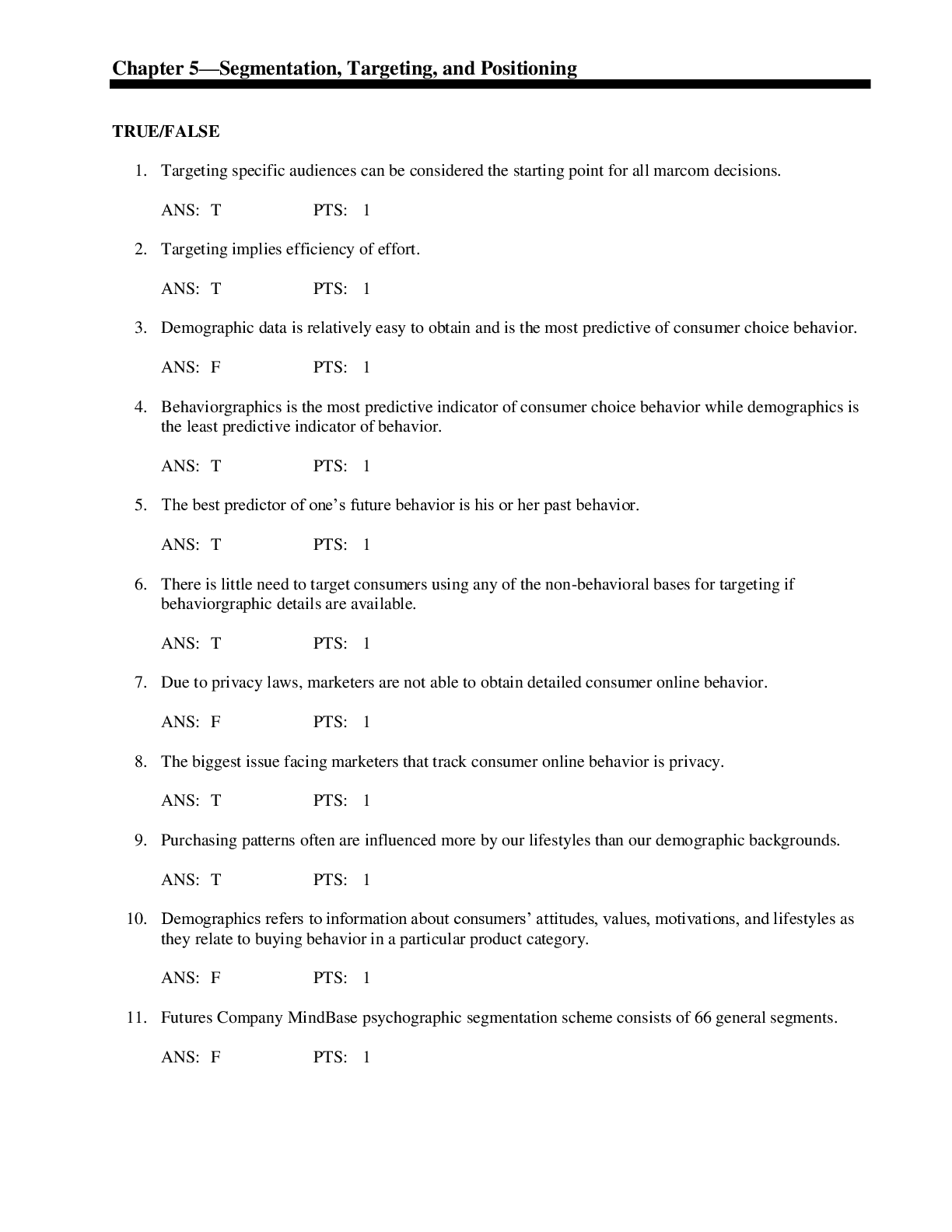History > QUESTIONS & ANSWERS > Giant AP Euro Terms List Questions and Answers Already Passed. Rated A (All)
Giant AP Euro Terms List Questions and Answers Already Passed. Rated A
Document Content and Description Below
Giant AP Euro Terms List Questions and Answers Already Passed 95 Thesis ✔✔Religious thinker Martin Luther pinned this document to the door of a church, in protest to many church practices but e... specially indulgences., written by Martin Luther in 1517, they are widely regarded as the primary catalyst for the Protestant Reformation. Luther used these theses to display his displeasure with some of the Church's clergy's abuses, most notably the sale of indulgences; this ultimately gave birth to Protestantism. Spanish Armada ✔✔A Spanish fleet attempted to attack England and to overflow Elizabeth I, primarily to eliminate Protestantism. They failed epically, partly because of the weather., the Spanish fleet that attempted to invade England, ending in disaster, due to the raging storm in the English Channel as well as the smaller and better English navy led by Francis Drake. This is viewed as the decline of Spain's Golden Age, and the rise of England as a world naval power. Peace of Westphalia ✔✔This was the treaty that ended the Thirty Years' War that recognized the independent authority of over three hundred German principalities Glorious Revolution ✔✔William of Orange (renamed William III) invaded England at the request of its citizens. He overthrew James II and Catholicism along with him., In this bloodless revolution, the English Parliament and William and Mary agreed to overthrow James II for the sake of Protestantism. This led to a constitutional monarchy and the drafting of the English Bill of Rights. Treaty of Utrecht ✔✔The treaty that ended the War of Spanish Succession and stopped Louis XIV's attempts to gain more land for France, defending the balance of power. French Revolution ✔✔The French people overthrew the king and his government, and then instituted a series of unsuccessful democratic governments until Napoleon took over as dictator in 1799.Congress of Vienna ✔✔This agreement reorganized Europe following the defeat of Napoleon, restoring the balance of power., This was the meeting between the Quadruple Alliance in order to formulate a peace agreement and to balance the victories of the Napoleonic wars Revolutions of 1848 ✔✔A wave of political revolts beginning in France (of course), and spreading across Europe. They were all brutally put down. German Empire-1871 ✔✔Divided into states with no unified government. Russian Revolution ✔✔The revolution against the Tsarist government which led to the abdication of Nicholas II and the creation of a provisional government in March 1917 Great Depression ✔✔The economic collapse. Its repurcussions included the rise of totalitarian powers in many countries, and terrible conditions for those affected. 1989 Communism collapse ✔✔Began with the policies of Gorbachev which lead to revolts in Russian sattelites and establishment of democratic governments in them. Schmalkaldic League vs. HREmperor (Charles V) ✔✔The early wars of religion between northern Protestant states and southern Catholic states in the Holy Roman Empire. Spain (Philip II) vs. England (Elizabeth) ✔✔The Spanish Armada. These two countries/rulers wanted to eliminate Protestantism and Catholic interference, respectively. French Wars of Religion (Henry IV) ✔✔Internal conflict between the Catholics and the Huguenots, concluding with the Edict of Nantes.Thirty Years' War (1618-1648, Holy Roman Empire) ✔✔The war began with a Catholic/Protestant conflict and matured into a multi-state political conflict, mainly France and the Holy Roman Empire competing for European dominance. English Civil War ("Puritan Revolution", Cromwell) ✔✔Charles I was disliked, and avoided calling Parliament to keep his power. He was forced to, and this lead eventually to Oliver Cromewll declaring a commonwealth and bceoming Lord Protector. Louis XIV ✔✔This French king ruled for the longest time ever in Europe. He issued several economic policies and costly wars. He was the prime example of absolutism in France. War of Spanish Succession ✔✔The powers of Europe fought against a possible unity of France and Spanish, which would then upset the balance of power. It was ended by the Treaty of Utrecht. War of Austrian Succession (Maria Theresa, Austria and Frederick II, Prussia) ✔✔A war sparked by challenges to Maria Theresa, as a woman, ascending to the Austrian throne. The most important consequence was the Prussians gaining Silesia. Seven Years' War ✔✔Known in America as French and Indian war. It was the war between the French and their Indian allies and the English that proved the English to be the more dominant force of what was to be the United States both commercially and in terms of controlled regions. French Revolution/Napoleonic Wars ✔✔These wars began with the rise of an (eventual) French dictator, who conquered nearly all of Europe. Crimean War ✔✔Officially over the right to the Holy Land, this war was mainly about Russia trying to keep hold of its naval base in the Crimea.France & Piedmont vs. Austria—1859 (Italian Unification) ✔✔Piedmont ruler Cavour dragged France into war with Austria to assist with Italian unification. France later backed out, but it still assisted Italian unification. Austro-Prussian War—1866 ✔✔Officially over an Austrian/Prussian disagreement of policy, but actually from Bismark's desire to rid himself of Austria, this war paved the way to German unification. Franco-Prussian War—1870-71 ✔✔France attacked Prussia to attempt to stop them becoming too powerful. Prussia won, and Napoleon III was dethroned. This war established the Third French Republic and the German Empire World War I ✔✔War sparked by assassination of Archduke ferdinand. Causes were nationalism, and romanticism. Resulted in a humiliating German defeat and the establishment of communism in Russia Spanish Civil War ✔✔In 1936 a rebellion erupted in Spain after a coalition of Republicans, Socialists, and Communists was elected. General Francisco Franco led the rebellion. The revolt quickly became a civil war. The Soviet Union provided arms and advisers to the government forces while Germany and Italy sent tanks, airplanes, and soldiers to help Franco. World War II ✔✔Global conflict that stemmed from unresolved WWI issues, declarations came after Germany invaded Poland. Germany gained almost all of Europe before its defeat began with the loss in Stalingrad. Cold War ✔✔The ideological struggle between communism (Soviet Union) and capitalism (United States) for world influence. The Soviet Union and the United States came to the brink of actual war during the Cuban missile crisis but never attacked one another. (831)Ivan the Terrible ✔✔Leader whose actions were puzzling and cruel but who did lay the foundations for a new Russian state that included old Ievan Russia and stretched from Siberia to the Caspian Sea Mikhail Romanov ✔✔First Romanov czar, ends the "Time of Troubles" in which there is chaos over who should rule Russia Peter the Great ✔✔This was the czar of Russia that Westernized Russia and built up a massive Russian army. He also was interested in building grand cities like those in Western Europe Procurator ✔✔Lay official of the Russian church; represented the interests of the tsar and extended control of the tsar over the church. St. Petersburg ✔✔Capitol city created by Peter the Great to resemble a French city. Part of Peter's Westernization and attempts to get a warm-water port. Catherine the Great ✔✔This was the empress of Russia who continued Peter's goal to Westernizing Russia, created a new law code, and greatly expanded Russia Pugachev's Rebellion ✔✔1773, tried to restore traditional system with rights for peasants. Alexander I ✔✔Seemed open to liberal ideas, he eased censorship, and promoted education, he talked about freeing the serfs, he then drew back from reform, because he feared losing noble support at the Congress of Vienna he joined the conservative powers opposing liberal and national impulses. Nicholas I ✔✔Russian Tsar that succeeced Alexander; he strengthened the secret police and the bureaucracy. He was also wiling to use Russian troops to crush revolutions, as he greatly feared them.Alexander II ✔✔A Russian Tsar who implemented rapid social change and general modernization of Russia, including emancipating the serfs. Emancipation of Serfs ✔✔Tsar Alexander II ended rigorous serfdom in Russia in 1861; serfs obtained no political rights; required to stay in vilages until they could repay aristocracy for land. Zemstvos ✔✔Elected local rural governments that allowed some democracy without weakening the central government. Mir ✔✔A village or community with the idea that all members of a community must work together cooperatively to assure mutual survival (thus the sharing of work, food and in the cold winter months warmth). Alexander III ✔✔This Czar removed many of the reforms his father created and recentralized the government. Nicholas II ✔✔Last czar or Russia during the revolution and WWI, abdicated, killed with family by the Bolsheviks. Russian Revolution ✔✔The revolution against the Tsarist government which led to the abdication of Nicholas II and the creation of a provisional government in March 1917. Russian Civil War ✔✔(October 1917) Bolshevik Party seized power and created civil war between Bolsheviks and supporters of Tsar that Bolsheviks had executed but Bolsheviks won Red Terror ✔✔The campaign of mass arrests and executions conducted by the Bolshevik governmentLenin ✔✔Founded the Communist Party in Russia and set up the world's first Communist Party dictatorship. He led the October Revolution of 1917, in which the Communists seized power in Russia. He then ruled the country until his death in 1924. Mr. Lorme's favorite. NEP (New Economic Policy) ✔✔A small scale version of capitalism. Alowed peasants to sell excess crops & allowed small factories and businesses to be under private ownership. (Govt. still controlled major businesses & factories) Trotsky ✔✔A Bolshevik revolutionary and Marxist theorist. He was one of the leaders of the Russian October Revolution, second only to Lenin. Stalin ✔✔Russian leader who succeeded Lenin as head of the Communist Party and created a totalitarian state by purging all opposition (1879-1953) Collectivization ✔✔System in which private farms were eliminated, instead, the government owned all the land while the peasants worked on it. Five Year Plans ✔✔Stalin's plans to to make the economy fully industrial. All resources were devoted to these efforts. As a result Soviet people lacked food, housing, clothing BUT Economy grew Battle of Stalingrad ✔✔Unsuccessful German attack on the city of Stalingrad during World War II from 1942 to 1943, that was the furthest extent of German advance into the Soviet Union. Turning point of the war. Khrushchev ✔✔Soviet leader, publicly denounced Stalin, free many political prisoners eased censorship Thaw ✔✔A relaxing of Soviet policies following Stalin's death, including censorship and private ownership.Brezhnev ✔✔"No experimentation.", "re-Stalinization" modest liberalization and more consumer goods Gorbachev ✔✔Soviet statesman whose foreign policy brought an end to the Cold War and whose domestic policy introduced major reforms (born in 1931) Perestroika ✔✔"Restructuring," a policy initiated by Mikhail Gorbachev that involved restructuring of the social and economic status quo in communist Russia towards a market based economy and society Glasnost ✔✔Policy of openness initiated by Gorbachev in the 1980s that provided increased opportunities for freedom of speech, association and the press in the Soviet Union. Yeltsin ✔✔First person ever elected by popular vote in Russia; drafted a new constitution similar to France's which established a mixed presidential-parliamentary system anchored in a powerful presidency Charles V ✔✔This was the Holy Roman Emperor that called for the Diet of Worms. He was a supporter of Catholicism and tried to crush the Reformation by use of the Counter-Reformation Peace of Augsburg ✔✔Ended the religious wars. The division of Christianity was formally acknowledged, with Lutheranism granted equal legal standing with Catholicism. Defenestration of Prague ✔✔The hurling, by Protestants, of Catholic officials from a castle window in Prague, setting off the Thirty Years' War. Gustavus Adolphus (Sweden—30 Years War) ✔✔A Swedish leader who fought against the Catholics in the Thirty Years' War. Successful at first, but when he died Sweden asked for peace.Peace of Westphalia ✔✔This was the treaty that ended the Thirty Years' War that recognized the independent authority of over three hundred German principalities Charles VI ✔✔Obsessed with keeping the Habsburg empire together, issued the Pragmatic Sanction. No male heir so the empire passed to Maria Theresa. Pragmatic Sanction ✔✔This was the act passed by Charles VI that stated that Hapsburg possessions were never to be divided, in order to allow his daughter to be ruler. Maria Theresa ✔✔This was the queen of Austria as a result of the Pragmatic Sanction. She limited the papacy's political influence in Austria, strengthened her central bureaucracy and cautiously reduced the power that nobles had over their serfs Joseph II ✔✔This was the ruler of the Habsburgs that controlled the Catholic Church closely, granted religious toleration and civic rights to Protestants and Jews, and abolished serfdom Declaration of Pillnitz ✔✔A statement agreed upon by Leopold II and Fredrick William II to intervene if Louis XVI was threatened by revolution Age of Metternich ✔✔Period when Metternich had immense influence of Euopean politics. Revolution of 1848 ✔✔members of the working class in Paris united to overthrow the regime of Louis Phillippe and creat the Second French revolution Ausgleich (Compromise of 1867) ✔✔Established the Dual Monarchy of Austria and Hungary: Separate governments except for a common King. Franz Joseph ✔✔The ruler of Austria-Hungary when WWI started. He was planning to attack Serbia for their ports. When Serbia murdered Franz Ferdinand, he attacked Serbia, which effectively started WWI.Balkan Crises ✔✔A series of events in the Slavic countries, any one of which could have started World War I. The third eventually did. Franz Ferdinand ✔✔Archduke of Austria Hungary who was assassinated at Sarajevo by a Serbian terrorist group called the Black Hand; his death was a main cause for World War I. Sarajevo, Bosnia ✔✔Austria annexed Bosnia (the first Balkan crisis) to prevent Slavs there from uniting with Serbia and challenging Austrian power. Russia disapproved but did not act. Anschluss ✔✔Union between Austria and Germany, a violation of the ToV and Austria refused so Germany invaded. Czechoslovakia ✔✔Declared its independence from Austro-Hungary in 1918. Yugoslavia ✔✔This country was created after WWI, uniting ethnicities that spoke similar Slavic languages. Soviet satellites ✔✔Eastern European nations with communist puppet governments; policies were loosely controlled by the USSR Iron Curtain ✔✔Winston Churchill's term for the Cold War division between the Sovietdominated East and the US-dominated West. Uprising in Hungary ✔✔A student demonstration spread into a revolt that overthrew the government. Soviets intervened and took over the country. Berlin Wall ✔✔In 1961, the Soviet Union built a high barrier to seal off their sector of Berlin in order to stop the flow of refugees out of the Soviet zone of Germany. The wall was torn down in 1989.Prague Spring ✔✔A period of political liberalization in Czechoslovakia during the era of its domination by the Soviet Union after World War II. It ended with Soviets invading. Vaclav Havel ✔✔Czech playwright that called for the independence of Czechoslovakia by 1989; became the first President of Czechoslavakia and the first President of the Czech Republic in 1993 Ceausescu (Romania) ✔✔Communist leader and President of Romania. When the people rebelled he killed them. Tito (Yugoslavia) ✔✔Yugoslav statesman who led the resistance to German occupation during World War II and established a communist state after the war (1892-1980) Civil War in Yugoslavia ✔✔Bitter ethnic conflicts lead to wars of independence. Most ended with democratic institutions being established. ethnic cleansing ✔✔Process in which more powerful ethnic group forcibly removes a less powerful one in order to create an ethnically homogeneous region Polish Diet ("Liberum Veto") ✔✔known as "exploding the diet" it allowed one member to disband the diet of Poland Partitions of Poland ✔✔Poland divided between Russia, Austria, and Prussia; changed the balance of Europe as a whole; Russia, Austria, and Prussia progressed passed France Solidarity ✔✔Polish trade union created in 1980 to protest working conditions and political repression. It began the nationalist opposition to communist rule that led in 1989 to the fall of communism in eastern Europe.Lech Walesa ✔✔Co-founded Solidarity, the Soviet bloc's first independent trade union, won the Nobel Peace Prize in 1983, and served as President of Poland. Frederick William ("Great Elector") ✔✔the Elector of Brandenburg who rebuilt his domain after its destruction during the Thirty Years' War (1620-1688), placed very strong emphasis on the army Frederick I ✔✔He was the successor and uncle of Christian II. He encouraged Lutheran preachers to spread their evangelical doctrines and to introduce a Lutheran liturgy into the Danish church service. Frederick William ✔✔the Elector of Brandenburg who rebuilt his domain after its destruction during the Thirty Years' War (1620-1688) Frederick II ("The Great") ✔✔Known as the Great, worked to expand territory and prestige of Prussia,king of Prussia from 1740 to 1786 Kaiser William I ✔✔William I of Prussia declares himself Kaiser of Germany at Versailles after winning the Franco-Prussian war Frankfurt Assembly ✔✔German Parliament met in Frankfurt to fulfill a liberal and nationalist dream: the preparation of a constitution for a united Germany Reichstag ✔✔Seated Germany's lower house of Parlimrent, it burned in 1933 and Hitler blamed it on the communist, this event led to Hitler becoming the absolute dictator in Germany. Bismarck ✔✔Prime Minister of Prussia (largest state in Northern Germany); wanted a greater, unified Germany (smaller Southern states to join Prussia; preferred "iron and blood" to diplomacy.German Empire (1871) ✔✔Unified by Bismark of Prussia, the German empire was created after the Franco-Prussian war. This Empire evolved into Germany, which played a key part in both WWI and WWII. Social Democrats ✔✔Social democracy promotes the creation of economic democracy as a means to secure workers' rights. Social democracy rejects the Marxian principle of dictatorship of the proletariat, claiming that gradualist democratic reforms will improve the rights of the working class. Kulturkampf ✔✔Bismarck's anticlerical campaign to expel Jesuits from Germany and break off relations with Vatican. Eventually, after little success, Bismarck halted these policies. Social Security ✔✔a system of federal financial support for retired workers and workers unable to continue working because of a disability Eduard Bernstein ✔✔German social democratic theoretician and politician, a member of the SPD, and the founder of evolutionary socialism and revisionism. Kaiser William II ✔✔last German Emperor and King of Prussia, ruling both the German Empire and the Kingdom of Prussia from 15 June 1888 to 9 November 1918. Schlieffen Plan ✔✔Attack plan by Germans, lightning quick attack against France. Proposed to go through Belgium then attack France, Belgium resisted, other countries took up their aid, long fight, used trench warfare. Weimar Republic ✔✔The new German republic the in 1921 owed 33 billion annually to the allied reparations commission. In order to recover from its severe economic issues the annual fees were reduced each year depending on the level of German economic prosperity and Germany received large loans each year from the United States.Third Reich (Nazism) ✔✔The Third Republic of Germany which began Hitler's rule in 1933 and ended with his defeat in 1945 Hitler ✔✔Nazi leader and founder; had over 6 million Jews assassinated during the Holocaust SS ✔✔special police force in Nazi Germany founded as a personal bodyguard for Adolf Hitler in 1925 Himler ✔✔leader of the SS, helped with the final solutions cause Konrad Adenauer ✔✔The first chancellor of West Germany; he was able to establish a stable democratic government. Willy Brandt ✔✔Chancellor of West Germany in the late 1960s; he sought to improve relations with the states of Eastern Europe. Honecker ✔✔East German dictator from 1971 to 1989 that ruled with an iron fist, secret police and refusal of reforms; in 1989, his economic policies cause a mass East German migration through Hungary to get to West Germany, which caused him to open borders with West Germany Berlin Wall ✔✔Concrete barrier constructed by the Soviets in August 1961 between West Berlin and East Berlin to prevent East Germans from fleeing to the West. (In 1990, the wall was torn down.) St. Bartholomew's Day Massacre ✔✔wipes out protestantism, kills 7,000 people, france remains catholic Henry IV (Henry of Navarre) ✔✔Henry of Navarre; was protestant but did not wish to anger catholics. Said "Paris is well worth a mass"Edict of Nantes ✔✔This was the document published by Henry IV that granted liberty of conscience and liberty of public worship to the Huguenots Cardinal Richelieu ✔✔This was the man who influenced the power of King Louis XIII the most (his chief advisor) and tried to make France an absolute monarchy Cardinal Mazarin ✔✔Successor of Cardinal Richelieu and his bad attempts to increase royal revenue and the state lead to the Fronde Louis XIV ✔✔This French king ruled for the longest time ever in Europe. He issued several economic policies and costly wars. He was the prime example of absolutism in Fran [Show More]
Last updated: 2 years ago
Preview 1 out of 42 pages

Buy this document to get the full access instantly
Instant Download Access after purchase
Buy NowInstant download
We Accept:

Reviews( 0 )
$8.00
Can't find what you want? Try our AI powered Search
Document information
Connected school, study & course
About the document
Uploaded On
Sep 28, 2022
Number of pages
42
Written in
Seller

Reviews Received
Additional information
This document has been written for:
Uploaded
Sep 28, 2022
Downloads
0
Views
152
